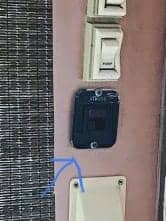T’was a frigid February night in Louisville, Kentucky and not a creature was stirring – except my lovely wife…
We’d just parked our RV and wifey was ready for a hot shower after a long cold ride. But alas, on this frigid eve, when she flipped the “on” switch for our RV water heater, it refused to ignite.
You know that saying “happy wife, happy life”? It quickly became clear to me on that cold night that if I didn’t get my RV water heater fixed, I was going to be in for a wildly unhappy evening.
My wife took this picture because she thought it was funny, but when you’ve got a broken RV water heater on a cold night, these words are truer than Antartic frost.
So, I acted fast and managed to get my pesky RV water heater to fire up. Here’s how you too can troubleshoot and fix a broken RV water heater:
How do you know when your RV water heater is broken?
Besides the obvious issue of no hot water, all propane RV water heaters will have a “tell” that’ll alert you to a problem. Propane-powered RV water heaters have a switch that looks something like this:
This is a common style switch for an RV water heater. If your RV water heater is working properly, you should be able to switch it on and the red “reset light” will light up for a few seconds until ignition. Any other behavior from this switch indicates trouble with your RV water heater.
Looking at the above photo, you will see a red light near the word “reset”. When you switch your water heater on, that light should glow red for a few seconds and then shut off when your RV water heater fires up. If the water heater is near you, you should hear the “clicking” sound of the ignitor followed by the “whoosh” sound of ignition.
If you flip the switch and nothing happens and/or if other RV electric appliances aren’t working, you may have electric power loss.
If you flip the “on” switch to your RV water heater and that light continues glowing red without shutting off, this means you’ve got a failure to ignite. As long as that’s happening, you’ll have no hot water, which is exactly what I encountered that cold February evening.
But how do you diagnose and fix the exact problem with your broken RV water heater?
It is to that endeavor which we now turn…
First, make sure you’ve got gas
If the red light on your RV water heater switch keeps glowing, try standing next to the water heater to listen for what it’s doing. If you hear it go “click-click-click” multiple times without lighting, you may just be running low on propane.
In this case, simply check your propane levels and refill if needed.
You’ve got propane, but is it flowing to your RV water heater?
If you haven’t run your RV water heater in a long time, it could be that you’ve simply got air built up in your gas lines. To test for this, try to fire up other propane appliances. In my case, I always fire up my stove, furnace, and switch my fridge over to propane. Once those have been running for a few minutes, I then attempt to fire my RV water heater. If all your other propane appliances are lighting but your water heater is not, you may have an isolated gas flow issue. In other words, propane could be flowing through the lines but not getting to your RV water heater.
If all your other propane appliances are running and your RV water heater makes the “click-click-click” sound without igniting, it is best to shut all propane appliances off and close your propane tanks.
IMPORTANT: If all other propane appliances are working and you can hear your RV water heater attempt to ignite without firing, you will need to seek the help of a qualified RV professional. For safety’s sake, a gas flow issue is not something to DIY.
You’ve got propane and it’s getting to other appliances, but you don’t hear the “click-click-click” sound from your RV water heater
When I went outside on that cold Kentucky evening, I stood next to my water heater and experienced a telltale sign… Even though all my other propane appliances were running smoothly, I didn’t hear the “click-click-click” of my RV water heater attempting to ignite.
When this happens, you’ve likely got one of two problems: your ignitor is bad or your circuit board is fried.
Fortunately, either of these issues are very DIY’able.
Run around to the outside of your RV and you’ll see a cover that looks like this. This apparatus is your RV water heater. Under normal operation, you would hear a “click-click-click” right after you flip the on switch. The clicking should be followed by the “whooshing” sound of ignition. If you do not hear that clicking, it is likely an issue either with the ignitor or your circuit board.
How to fix a broken RV water heater when you have propane and don’t hear the “click-click-click” sound of your water heater trying to ignite
When you’ve got gas flow but don’t hear the sound of your water heater trying to ignite, the chances are strong that your problem is either a bad ignitor or a bad circuit board.
The ignitor is like a spark plug for your RV water heater. If it isn’t “clicking” that’s either because it’s fried or isn’t getting power.
You first want to see if power is getting back there. To do this, you will need a multimeter.
No products found.
A multimeter is a tool that no RV’er should be without. It’ll come in handy to fix your RV water heater and a number of other issues that may come up.
The following video is long, but well worth the watch because it’ll show you how to use a multimeter to test your RV water heater. It will also give you an overview of a number of other issues we’ve discussed.
How to fix a bad circuit board on an RV water heater
If your multimeter isn’t even detecting power coming from the circuit board on your RV water heater, this is the first thing you’ll need to fix.
Good news: it’s easy to replace a circuit board for an RV water heater.
Bad news: RV parts stores don’t always stock them, so you may have to order one and wait a few days.
This fun video will show you how to replace a water heater circuit board:
How to fix a bad safety fuse on an RV water heater
All RV water heaters have a fuse just above the gas flow line that will interrupt the electric current in the event of a gas leak. This video will show you exactly what I’m talking about:
If that fuse has blown out, you can easily replace it, but I would strongly urge you to go to an RV shop to confirm you don’t have a gas leak. While these fuses often go bad on their own, they can also blow out due to gas leaking which you need to check immediately.
How to fix a bad ignitor on an RV water heater
After I used my multimeter to test my RV water heater, I found that power was getting to my circuit board and through the safety fuse to my ignitor. This meant that my ignitor was bad, so I then had to hunt one down at my nearest RV parts store. Fortunately, it is a commonly stocked item, so I found one without much trouble.
All you need to do is get the exact model of your RV water heater and let the RV shop know you need an ignitor for it. Most of the time the model number will be on the water heater itself. Once you have the ignitor, you simply need to unplug and unscrew the old ignitor assembly and screw+plug in the new one.
Have a look at minute 1:40 of this video to see exactly what an RV water heater ignitor looks like:
A broken RV water heater doesn’t always have to be cause for serious alarm. Propane water heaters have been fundamentally the same for decades, meaning that parts and DIY knowledge are widely available. So, if ever you find yourself in cold water with a broken RV water heater, you can take comfort knowing that a warm fix probably isn’t too far away.

Jill Miller is the founder of Your RV Lifestyle. Trading corporate America for the open road, Jill, along with her partner Jose, began their RV journey, making an unconventional start by wintering in New Jersey. A natural adventurer, she was motivated by a desire to explore the USA and beyond, embracing the varied landscapes, communities, and cultures across the country.
For Jill, the allure of RV living was not about material accumulation, but rather the pursuit of an adventurous, fulfilling lifestyle. A lover of golf, bicycling, hiking, and line dancing, she has carried her passions across the country, engaging with them in diverse settings. Jill’s commitment to the RV lifestyle came after years of careful research, numerous consultations with RV owners, and personal trials, including living in a rental RV.


